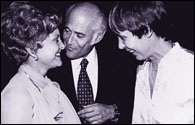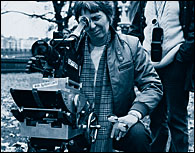The Surprising Career of Virginia Carter (Page 2)
The Surprising Career of Virginia Carter (Page 2) McGill University
User Tools (skip):
The Surprising Career of Virginia Carter (Page 2)
Norman Lear happened to be the Time magazine cover story the following week, making Carter even less inclined to meet him. What could this Hollywood big shot possibly have to say to a physicist? Eventually Carter agreed to a meeting as a courtesy to her new friend, and the two got along famously. "Norman didn't know anything about physics and I didn't know anything about Hollywood, so we talked about ideas, about my breast cancer, about pacifism and some of the other issues that had been occupying much of my time."
 Former First Lady
Betty Ford, Norman Lear and Virginia Carter at an early 1980s screening
of Maude. Former First Lady
Betty Ford, Norman Lear and Virginia Carter at an early 1980s screening
of Maude.
|
|
|
|
|
Three weeks later, Lear called from New York and suggested another meeting. "I thought this was a bit much," Carter recalls, smiling at the memory of her indignation. "After all,
I'd fulfilled my social obligation and I couldn't figure out why he wanted to get together again. I was due to take a six-week holiday in Japan and I was looking forward to a change of pace and a change of scenery."
She did, however, agree to meet Lear again, deciding that if he tried to offer her a job, she'd cite her trip as an excuse, and then ask for an outrageous salary that would far surpass her $18,000 Aerospace income. "I figured I'd ask him for some huge sum -- like $25,000," Carter chuckles. "I was sure he'd choke on it!"
Lear did indeed offer her a job and responded with a breezy "No problem" to both obstacles she presented. Asked what made him want to hire Carter, Lear concedes that, from a "cursory viewpoint, the possibility of someone from the world of physics fitting into the world of entertainment seems unlikely. But I was interested in what she could teach me and my company about the fledgling women's movement, and, in fact, about being a decent human being." Lear now calls Carter "one of my five favourite people in the whole world."
Carter was installed in the office next to Lear's as Director of Creative Affairs. That was in 1973. It wasn't long before she discovered that her seat "at God's right hand" afforded her the kind of decision-making power and respect she had been denied in her scientific work.
Jean Stapleton, the beloved Edith of All in the Family, knows Carter's transition from physics to entertainment wasn't easy, "but she was very receptive. She understood that there was a lot to learn and that things might be difficult. She took a lot of lip and she handled it well." Adds Stapleton, "She came in as a complete amateur but the outcome was so good that I'm sure Norman knew exactly what he was doing when he hired her."
|
|
 Carter on the
London film set of Eleanor, First Lady of the World, Carter on the
London film set of Eleanor, First Lady of the World,
|
|
|
|
The logic and orderly thinking acquired at McGill and the understanding of how to exert authority learned in the Air Force were assets in the rarified and often unpredictable Hollywood environment. Carter's special interest in adding social content to Lear's shows combined beautifully with what Carter acknowledges as Lear's "genius" for creating characters whose views of the world and of each other challenged viewer complacency. "We understood that we had to offer real entertainment," says Carter. "Once we got people watching, we could add the kind of content that would give substance to the plots."
After a year on the air, Archie Bunker was North America's best-known bigot, and All In The Family was a Saturday night prime time fixture. Episodes of All In The Family, Maude and The Jeffersons featured a cluster of feisty personalities who were foils for the conformist characters in The Brady Bunch and The Waltons, and offered gritty relief from the still-popular variety shows featuring the likes of Julie Andrews and Sonny and Cher.
Lear's shows forced taboo issues -- depression, racism, alcoholism, mid-life pregnancy, rape -- onto the TV screens of middle America. Behind every issue was serious intent: to raise the public consciousness and, where possible, to initiate change. "We put a tag line at the end of the show on manic depression, telling people where to get help," says Carter. "And after we did the show in which Edith Bunker was raped, some people at the Rape Crisis Centre in LA wrote a manual which they distributed to police stations all over the country. We didn't merely want to entertain -- we wanted to make things happen!" For their efforts, Carter and Lear joined thousands of others on Richard Nixon's "hit list" as they sought to bring the most important issues of the day to the attention of the thinking public.
In 1976, Carter earned her first promotion ever -- to VP Creative Affairs at Embassy Productions, a tribute, Lear says, "to her abilities and her hard work." In 1983 she formed a movie division at the company, to make films specifically for a television audience. She was executive producer of The Wave, based on a true story about a classroom experiment that went wrong. The film follows the creation of a student organization (The Wave) by a California history teacher in order to explain how the Holocaust could have happened. But students begin to follow his constructed rules of "strength through discipline, community and action" too far, and dissenters are beaten. The movie won both a Peabody and an Emmy Award in 1981. Another Carter production, Eleanor, First Lady of the World, starring Jean Stapleton as Eleanor Roosevelt, was nominated for an Emmy and a Golden Globe Award in 1982.


